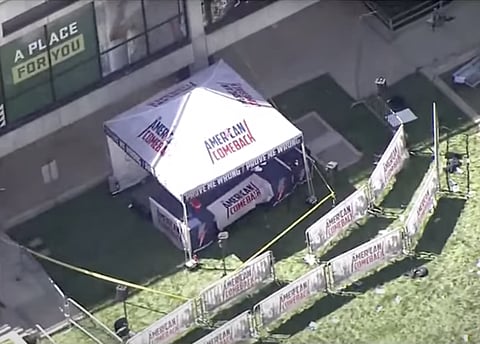

The Assassination
Charlie Kirk, the 31-year-old founder of the conservative youth group Turning Point USA and a close ally of President Donald Trump, was fatally shot on September 10, 2025, while addressing an outdoor event at Utah Valley University. The gunman, positioned on the roof of a campus building approximately 100 meters away, fired a single shot that struck Kirk in the neck, causing him to collapse on stage and sending the crowd of 3,000 attendees into panic. Despite the presence of six university police officers and Kirk’s private security detail, the assailant escaped initial capture, prompting a multi-agency manhunt led by the FBI and Utah law enforcement.
Investigation
Authorities released images of a "person of interest" captured on security cameras, describing an individual wearing a black top, sunglasses, and a baseball cap. The FBI recovered a high-powered bolt-action Mauser rifle wrapped in a towel in a wooded area near the campus, with spent cartridges bearing markings characterized as "transgender and anti-fascist" writing, though investigators noted these could be intentional misdirection. Despite briefly detaining two individuals, one charged with obstruction and another released after interrogation no suspect remained in custody as of September 11. The FBI offered a $100,000 reward for information leading to an arrest.
Political Reactions
The assassination drew widespread condemnation from both sides of the political spectrum. President Trump labeled the killing a "political assassination" and announced plans to posthumously award Kirk the Presidential Medal of Freedom, stating, "Charlie was a giant of his generation, a champion of liberty". Democratic leaders, including California Governor Gavin Newsom and former Congresswoman Gabby Giffords, unequivocally denounced the violence, with Giffords emphasizing, "We must never allow America to become a country that confronts disagreements with violence". Utah Governor Spencer Cox emotionally declared, "Our nation is broken," referencing recent attacks on both Republican and Democratic figures.
The Rising Political Violence
Kirk’s death occurs amid a documented surge in U.S. political violence. According to Reuters, at least 300 cases occurred between January 2021 and the 2024 election, marking the most significant sustained increase since the 1970s. The first half of 2025 saw approximately 150 politically motivated attacks, nearly double the same period in 2024 including the June murder of Minnesota Democratic legislator Melissa Hortman, the August shooting at a CDC facility in Atlanta, and two assassination attempts against Trump in 2024. Researchers attribute this escalation to economic insecurity, demographic anxieties, inflammatory political rhetoric, and the proliferation of conspiracy theories on social media.
Expert Warnings of a "Vicious Spiral"
Experts warn that Kirk’s killing could exacerbate existing tensions. Mike Jensen of the University of Maryland noted that the U.S. is in a "very, very dangerous spot" where isolated acts could ignite broader civil unrest. Jon Lewis of George Washington University observed that violence is increasingly normalized, often lacking clear ideology but driven by retaliatory motives. Lilliana Mason of Johns Hopkins University added, "People are reluctant to engage in violence first, but they’re much more willing to engage in violence as retaliation". Jensen further cautioned that the Trump administration’s policies, polarizing to many could fuel a "vicious spiral" of reciprocal violence.
The National Climate
The incident reflects deepening societal fractures. NPR polling indicates that while 75% of Americans view political violence as a major problem, 6–8% support using force to advance political goals, representing millions of individuals. The assassination has intensified debates over security for public figures, with Republican House Speaker Mike Johnson reporting a "deluge" of calls for enhanced protection. Meanwhile, the FBI’s investigation faces scrutiny after Director Kash Patel prematurely announced an arrest, later retracting the statement.